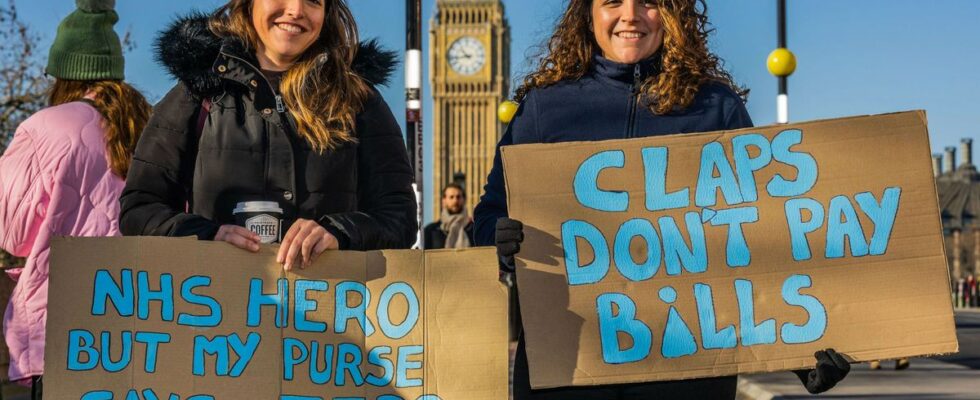They and they are tens of thousands to have stopped working at the same time. The nurses will be on strike again on Tuesday. Physiotherapists will disengage on Thursday. And paramedics will be back on the picket lines on Friday. Early Monday morning, staff from the NHS, the free public health service, joined the picket line, less than a week after the biggest strikes in the UK for a decade.
“Understaffed. Undervalued. Underpaid,” reads a sign held up by two nurses at St. Thomas’s Hospital in London. “Patients are sick, we are tired,” read another. The NHS, which a few years ago was the pride of the British, is going through a deep crisis, strangled by an austerity cure that has lasted for more than ten years and the consequences of the pandemic.
A real wage down 20% in ten years
Since its creation in 1948, it had never faced a strike of such magnitude, with tens of thousands of nurses and paramedics stopping work for the first time on the same day. They are demanding a pay rise as the United Kingdom, where inflation exceeds 10%, faces a severe cost of living crisis. But they come up against an inflexible Conservative government in the face of this movement supported by public opinion.
The organization that represents hospitals, NHS Providers, urged the public to use emergency services “reasonably” and warned that the service was approaching a “critical point”. “It’s going to be a real challenge,” said Saffron Cordery, deputy director of NHS Providers. She urged the government to sit around the table with the unions to find an agreement on wages for 2022/23 and then for next year.
“We have to recognize that NHS staff have had to deal with skyrocketing costs of living and inflation,” she said on Sky News television. According to the nurses’ union, the Royal College of Nursing (RCN), nurses’ pay has fallen by almost 20% in ten years in real terms, due to austerity policies which have hit the NHS hard. In some hospitals, food banks have been opened for staff.
Other civil servants demand pay rises
However, the conservative government of Rishi Sunak does not seem to want to budge. “The Governor of the Bank of England has warned that if we try to beat inflation with pay rises, the situation will only get worse and people will not be better off,” repeated the Minister of Health Steve Barclay in a statement. “If we are going to give nurses a pay raise, we will also have to look at teachers, paramedics,” said Secretary of State for Mental Health Maria Caulfield, noting that many civil servants are asking for raises.
The teachers were also on strike on February 1st. The movement has also affected railway workers for months, but also the post office, border police, etc. It would cost “billions of pounds”, according to the minister. A nurse herself, Maria Caulfield admitted to knowing “how difficult it is to live on a nurse’s salary”.
The nurses’ strike movement mainly affects England because negotiations are underway elsewhere. “The government has chosen to punish nurses in England instead of sitting around the table and talking to me about pay like they did in Wales and Scotland,” said Pat Cullen, the Secretary General of the RCN. On the ambulance side, for Sharon Graham, the head of Unite union, “the real problem is that at no time has this government addressed the fundamental question of remuneration”. She warned of a “constant cycle” of strikes if the government stuck to its guns.

